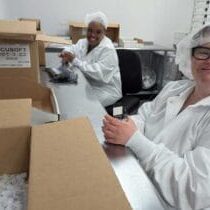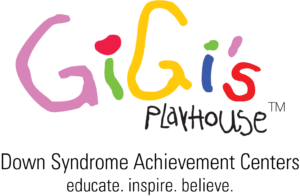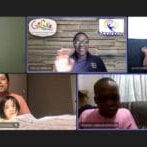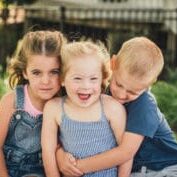Celebrating Down Syndrome Awareness Year-Round: Resources for Support & Acceptance
For many, October means Halloween, pumpkin patches, and crisp fall air. But for others, it represents something even more meaningful: Down syndrome awareness.
October is nationally recognized as Down Syndrome Awareness Month. It’s a time to educate, advocate, and celebrate the incredible contributions of individuals with Down syndrome. However, while awareness campaigns can shine a bright light during this month, real and lasting change requires commitment every single day of the year.
Awareness is only the beginning. Acceptance is the goal.
For too long, individuals with Down syndrome have been viewed through a lens of limitation. True inclusion means shifting from passive awareness to active acceptance, and ensuring that individuals with Down syndrome are given ample opportunities to thrive and succeed.
But true, societal-wide acceptance of Down syndrome doesn’t happen in a single month. It takes consistent action and support.
That’s where GiGi’s Playhouse comes in. As the only international network of Down Syndrome Achievement Centers, we’ve been helping communities become more accepting for over 22 years. At GiGi’s, we’re committed to changing the lives of individuals with Down syndrome and their families through the consistent delivery of free educational, therapeutic, and career development programs.
This blog is your go-to guide for getting involved in October and beyond. Whether you’re a family member, educator, friend, or ally, here are year-round ways to raise awareness, facilitate understanding, and help foster a more accepting world for the entire Down syndrome community.
Ready to get involved with GiGi’s Playhouse?
Why Down Syndrome Awareness Matters
When Jade’s preschool teacher realized she could recognize words and read, largely thanks to her time in GiGi’s Playhouse’s one-on-one literacy tutoring program, a lightbulb went off. If Jade, who has Down syndrome, was capable of learning to read… what else was she capable of?!?
That’s why Down syndrome awareness matters.
Because when people, like Jade’s teacher, become truly aware of Down syndrome, not just in passing but through meaningful interaction, they begin to see the true potential of people with Down syndrome.
Down syndrome awareness leads to exposure. Exposure leads to acceptance. And acceptance? It’s the real game-changer. True acceptance opens doors, changes perceptions, and helps individuals with Down syndrome thrive throughout all areas of life.
Unfortunately, not everyone sees that potential right away. Many still carry outdated beliefs. Others don’t know how to support someone with Down syndrome. That’s where you come in.
This blog isn’t just here to educate. It’s designed to give you clear, actionable strategies – not just to help you understand what it means to be accepting, but to give you a roadmap to help make the world more inclusive and supportive.
In this guide, you’ll find tips on:
- How to shift from awareness to acceptance
- Ways to support families in your community
- Free, life-changing resources available through GiGi’s Playhouse
- Actions you can take today to become an advocate
It’s important to remember that creating a more inclusive world doesn’t start in October; it starts with YOU.
History of Down Syndrome Awareness Month
Down Syndrome Awareness Month (DSAM) hasn’t always been part of the national consciousness. In fact, public awareness and understanding of Down syndrome have improved dramatically over the past few decades.
Like all meaningful change, it started with a spark, and in this case, the spark started in the 1980s.
In October 1984, President Ronald Reagan issued a presidential proclamation officially recognizing October as National Down Syndrome Awareness Month. This marked a significant step forward in bringing visibility to a community that had long been marginalized. At the time, many individuals with Down syndrome were still being institutionalized. Public knowledge around Down syndrome was limited and primarily based on harmful stereotypes.
But the presidential proclamation was the beginning of a cultural shift.
Around the same time, medical care, early intervention programs, and community-based support began to improve. Before the 1980s, the average life expectancy for a person with Down syndrome was just 25 years. Today, that number has more than tripled, with many individuals living well into their 60s and beyond. Medical advancements have played a significant role, and so has an emphasis on Down syndrome awareness, advocacy, and inclusion.
As society became more educated about Down syndrome, more families advocated for their children. Therapies expanded. And most importantly, the public started to understand that people with Down syndrome aren’t solely defined by their diagnosis.
Throughout the 1990s and 2000s, personal storytelling became one of the most powerful tools in the awareness movement. In recent years, self-advocates with Down syndrome have taken center stage, speaking at schools, leading events, and becoming active members of their communities.
Today, Down Syndrome Awareness Month is about more than education. It’s about action.
Organizations like GiGi’s Playhouse have helped drive this change by offering free, purposeful programs that unlock potential and build confidence. Our mission goes beyond awareness to drive global acceptance in October and all year round.
But despite all the progress, there’s still more work to do before individuals with Down syndrome are truly embraced by society on a collective level.
Want to see how GiGi’s Playhouse celebrates DSAM? Head here!
Want to learn more about the origins of DSAM? Click here to read President Reagan’s 1984 proclamation.
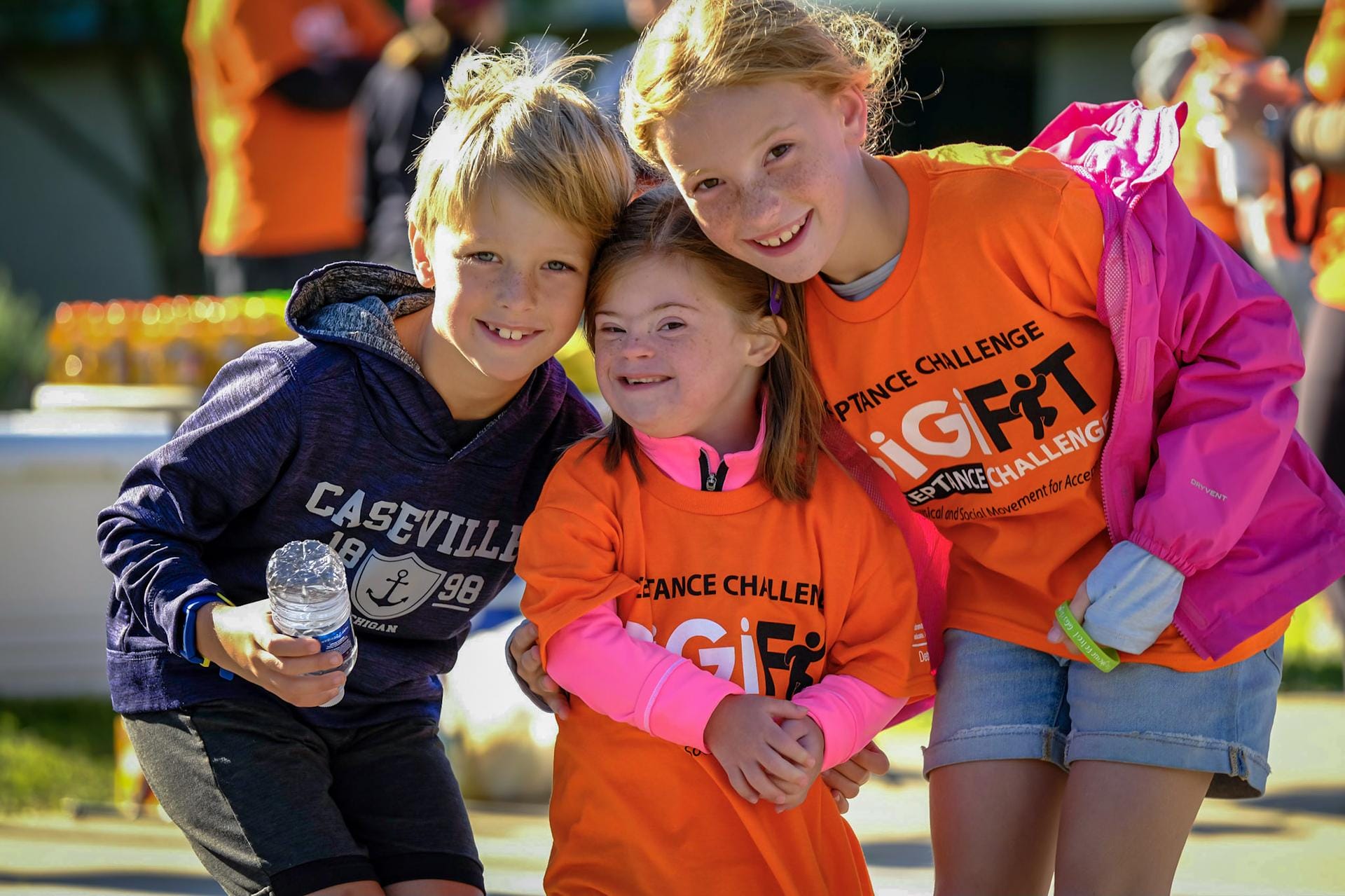
The Impact of Down Syndrome Awareness Month
Over the years, Down Syndrome Awareness Month has created real change. It’s helped people with Down syndrome gain visibility they were often denied.
The wins are real:
- Awareness campaigns in October have opened the door to more inclusive classrooms.
- Fundraisers and events have supported free programming and resources for families.
- Legislators and policymakers are increasingly hearing from self-advocates.
- And, maybe most importantly, DSAM has helped spark new conversations in homes, schools, and workplaces.
But awareness alone is not enough.
Many campaigns, though well-intentioned, fade once October ends. Social media posts slow down. Hashtags go quiet. And in many cases, stigmas persist, especially in spaces where real interaction with individuals with Down syndrome is rare.
This is why the conversation must evolve from baseline awareness to meaningful acceptance and inclusion.
True acceptance shows up in the decisions we make all year long: how we educate, who we hire, and whose voices we lift up. It means recognizing and celebrating all abilities, but it also means expecting more. More from our school, employers, and institutions.
Promoting Acceptance, Not Just Awareness
By now, we’ve talked a lot about awareness and acceptance, but let’s be honest: acceptance is a word that can be a little vague.
Sure, it sounds good, and it feels important. But what does it actually look like in everyday life?
Let’s break it down with real-world examples, clear definitions, and a few common myths we can leave behind for good.
At its simplest, here’s the difference:
- Awareness is knowing. It’s recognizing that Down syndrome exists, maybe learning some basic facts, and understanding that people with Down syndrome are part of our communities.
- Acceptance is doing. It’s inclusion in action: how we behave, speak, plan, and show up for people with Down syndrome in real, ongoing ways.
- Awareness says: “I know what Down syndrome is.”
- Acceptance says: “I will make sure this person is welcome, included, and supported.”
Still unsure of the difference? Let’s break it down with some real-life examples:
At School
- Awareness: Hosting a Down Syndrome Awareness Day.
- Acceptance: Including students with Down syndrome in general education classrooms with tailored support.
At Work
- Awareness: Sharing a social post during October.
- Acceptance: Creating inclusive hiring practices and building a supportive work environment year-round.
In Conversations
- Awareness: Saying things like “Everyone is special.”
- Acceptance: Using respectful, person-first language (“a person with Down syndrome”) and challenging stereotypes when you hear them.
In the Community
- Awareness: Attending a walk or event once a year.
- Acceptance: Volunteering at a Playhouse, becoming a mentor, or advocating for accessible and inclusive spaces in your neighborhood.
Acceptance isn’t complicated. It’s intentional. And when we get intentional about inclusion, EVERYONE benefits.
Tips to Spread Down Syndrome Acceptance
We’ve talked about what acceptance is and why it matters. Now, let’s talk about how to put it into action. Below, you’ll find real ways to champion inclusion and create change based on your everyday life and influence.
Explore the section that fits you best, or scroll through them all for inspiration.
Families and caregivers
Families and caregivers are often the strongest advocates for individuals with Down syndrome.
Start by understanding your child’s rights within the educational system, such as those outlined in IDEA (Individuals with Disabilities Education Act). Attend IEP (Individualized Education Program) meetings prepared with clear goals and questions to ensure your child’s needs are met. Use tools like sample IEP talking points to confidently advocate for accommodations or services.
Want to learn more as a parent or caregiver? No matter their age, learn how you can unlock your child’s potential here.
Educators and schools
Creating an inclusive classroom benefits all students. Use co-teaching models where general and special education teachers collaborate to meet diverse needs. Adapt lessons with visuals, hands-on activities, and clear instructions to support accessibility. Peer buddy programs also encourage social inclusion and friendship.
For deeper learning and practical strategies, consider attending GiGi’s Educator Symposium, where educators gain tools to foster acceptance and inclusion.
Learn more about the GiGi’s Educator Symposium here.
Employers and workforce partners
Hiring people with Down syndrome isn’t just the right thing to do. It’s good for business. Inclusion in the workplace brings fresh perspectives, a strong work ethic, and a more connected team culture.
Start by thinking differently about roles. Instead of a one-size-fits-all job description, look at how tasks can be matched to an individual’s strengths, whether it’s organizing, greeting customers, or handling hands-on work. With the right support, including mentorship or simple on-the-job guidance, individuals with Down syndrome can thrive.
Across the country, GiGi’s Playhouse locations are partnering with local businesses to make this happen, opening doors to meaningful employment in retail, hospitality, healthcare, and more.
Learn how your company can partner with GiGi’s Playhouse here.
Volunteers and community members
You don’t need a special role to make a difference. Being an everyday ally can be as simple as using respectful language, speaking up against stereotypes, or including people with Down syndrome in conversations and activities. Micro-volunteering, like sharing social media posts or organizing small community events, helps raise awareness.
However, the most meaningful change often happens through direct connection. Volunteering alongside individuals with Down syndrome and supporting them in programs, tutoring sessions, fitness classes, or social activities breaks down barriers and builds authentic relationships. You learn from each other, grow together, and help create a world that truly values inclusion.
GiGi’s Playhouse offers hands-on opportunities to get involved and be part of something bigger.
Head here to sign up to volunteer locally (or online) and help create a community where everyone belongs.
Media, creators, and influencers
The media shapes how we see the world and that includes how people perceive Down syndrome. From films and TV to everyday posts on social media, the stories we tell (and how we tell them) matter. Whether you’re a journalist, influencer, content creator, or just someone who shares moments online, you have the power to shift narratives and promote acceptance.
As we talked about earlier, use respectful language and choose person-first language. Always ask for consent when sharing someone’s story or photo, especially if it’s a personal moment.
Most importantly, represent individuals with Down syndrome as whole people: with strengths, challenges, humor, ambition, and everyday lives, not as stereotypes or inspiration tropes. Authentic storytelling builds understanding and breaks down bias.
Looking for tools to help you share stories with respect? Head to the GiGi’s Playhouse press room.

How GiGi’s Playhouse Builds Acceptance 24/7/365
You’ve seen how individuals – parents, teachers, media members, and neighbors – can help move the world from Down syndrome awareness to acceptance. But what happens when that energy is channeled into something bigger?
That’s the power of GiGi’s Playhouse. As the only international network of Down Syndrome Achievement Centers, we don’t just provide free educational and therapeutic programming; we’re also actively building a more accepting world every day. How do we do it? Let’s break it down:
Programs That Fuel Confidence
At the heart of every GiGi’s Playhouse location is a commitment to free, purposeful programming. These programs are more than just services; they are confidence-builders. Our programs help individuals with Down syndrome develop critical skills, build independence, and gain the tools they need to share their talents with the broader world.
When participants learn to read through one-on-one literacy tutoring, increase their communication skills through speech therapy, or build strength and coordination in a GiGiFIT class, they gain more than academic or physical progress. They gain confidence. And with that confidence, they step into their schools, workplaces, and communities ready to participate and contribute.
That visibility is powerful.
When classmates, coworkers, or community members see the capabilities of someone with Down syndrome – when they witness their talents, their humor, their drive – it challenges old perceptions. That exposure sparks understanding, and that understanding becomes acceptance.
Volunteers: The Heart of Our Mission
While our programs create acceptance by empowering participants, they wouldn’t exist without the volunteers who bring them to life. And these volunteers aren’t just running sessions. They also play an essential role in creating a more accepting world.
At GiGi’s, all our programs are 99% volunteer-led. But this isn’t just a cost-saving strategy. It’s a reflection of our mission. By inviting volunteers from outside the Down syndrome community into our Playhouses, we’re not only filling program roles; we’re creating opportunities for meaningful interaction, personal connection, and perspective-shifting experiences.
Whether someone comes in to tutor a child in math or help out at a weekend event, they walk away changed. They see what’s possible. They see the intelligence, determination, and personality in every participant. And most of all, they see potential.
That’s how perceptions shift. And that’s how awareness becomes acceptance.
Every Playhouse is a local hub for change in its community, but the impact is even more powerful when you zoom out.
Together, our growing network of Playhouses and the Virtual Playhouse form a movement that reaches across cities, states, and borders. What starts in a Playhouse changes a family. That family influences a neighborhood. That neighborhood shapes a community. And when enough communities start embracing inclusion and acceptance, the world changes.
#GenerationG: A Human Rights Movement
These programs, volunteers, and community connections are just some of the ways we spread acceptance and inclusion every day. But they’re all part of something even bigger: a global push for human rights, respect, and representation for individuals with Down syndrome. That movement is called #GenerationG.
At its core, #GenerationG is not a campaign. It’s a human rights movement. A commitment to the belief that everyone deserves to be accepted, respected, and included, no matter their diagnosis.
How do you become part of #GenerationG? It’s simple: choose to act.
Be generous with your time. Be kind in your conversations. Be bold in challenging outdated narratives. Whether you wear #GenerationG gear, share a story on social media, or simply make space at your table, you are advancing a global movement toward lasting inclusion.
Ready to Get Involved? Here’s how you can take action today:
Find Your Playhouse – Discover programs, events, and volunteer opportunities near you.
Volunteer – From one hour to one day a week, you can be part of something life-changing.
Donate – Your support keeps our programs free and fuels our expansion.
Join the #GenerationG Movement – Wear the gear. Share the message. Live the mission.
Resources and Toolkits
Looking for more ways to turn Down syndrome awareness into action? We’ve got you covered.
Whether you’re a parent, teacher, community leader, or advocate, GiGi’s Playhouse offers a variety of free, ready-to-use tools to help you spread acceptance in your everyday life.
You can download:
Plus, we’ve partnered with national organizations and leaders in the disability space to share even more trusted resources. You can check them out here.
Get Involved: This Month and Every Month
Down Syndrome Awareness Month may come once a year, but we all have the power to build a more accepting world every single day.
We’ve talked about the difference between awareness and acceptance and why it matters. We’ve shared how communities grow stronger when individuals with Down syndrome are seen, supported, and celebrated. And we’ve shown how programs, volunteers, and everyday interactions can shift perceptions in powerful ways.
But real change doesn’t just come from organizations. It comes from people. YOU can help spread acceptance by including others, challenging stereotypes, speaking up, and creating space for everyone to shine.
Now it’s your turn: start where you are, use what you have, and take one small action that leads to lasting impact.
Frequently Asked Questions
- What is Down Syndrome Awareness Month, and when is it observed?
Down Syndrome Awareness Month is observed every October. The entire month is dedicated to raising awareness, celebrating the abilities of people with Down syndrome, and promoting inclusion.
Down Syndrome Awareness Month is a chance to educate, connect, and challenge outdated stereotypes. But it also reminds us that awareness should not stop when October ends.
- Why is Down Syndrome awareness important year-round?
Simply put, inclusion isn’t seasonal. Awareness sparks understanding, but real acceptance comes from everyday interactions in classrooms, workplaces, and communities. The more we engage year-round, the more inclusive the world becomes for everyone.
- What is the difference between awareness and acceptance?
Awareness is more passive, but acceptance is active. Awareness is knowing someone has Down syndrome. Acceptance is believing in their potential, including them, and standing up for their rights. Awareness starts the conversation, but acceptance aims to change it.
- How can schools support acceptance for students with Down Syndrome?
Typical students cannot accept students with Down syndrome if they’re not exposed to them. Acceptance in school starts with more inclusive classrooms. In addition, respectful language and high expectations are great support for students with Down syndrome. Use GiGi’s free educator resources, celebrate each student’s progress, and make space for every voice to be heard.
- How do I volunteer with GiGi’s Playhouse?
It’s easy, and it’s life-changing. Whether you want to volunteer in person or online, we have a spot for you. Head to our volunteer page to explore one-time, ongoing, or skills-based opportunities. No experience with Down syndrome? No problem. Just bring your heart and your time.
- What is #GenerationG, and how can I participate?
#GenerationG is a human rights movement, bringing the next generation of change-makers together to foster a more kind, generous, and ACCEPTING world for individuals with Down syndrome and all those with a disability. Everyone can be #GenerationG. You can join by living it out: be kind, speak up, include others, and challenge outdated thinking.
Recent Posts
